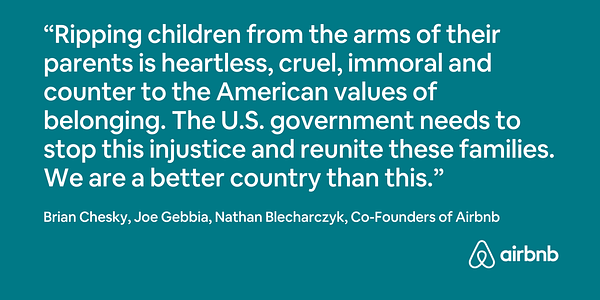 |
Former Deputy Attorney General Rod Rosenstein (Photo by Greg Nash-Pool/Getty Images)
A draft report by the Inspector General of the Department of Justice includes disturbing new information about the Trump administration's child separation policy. The report, which was obtained by the New York Times, reveals that the policy had a devastating impact on young children. "We have now heard of us taking breastfeeding defendant moms away from their infants. I did not believe this until I looked at the duty log,” a government prosecutor wrote in 2017.
While the Department of Homeland Security has shouldered most of the blame for the cruel policy, the Inspector General report reveals the key role played by leadership at the Department of Justice. A driving force behind the effort to separate infants from their parents as a "deterrent" was then-Deputy Attorney General Rod Rosenstein.
The report describes a conference call in May 2018 between then-Attorney General Jeff Sessions, Rosenstein, and a group of U.S. attorneys who objected to the new policy. Rosenstein admonished prosecutors who declined to press forward with cases that would have resulted in infants being separated from their mothers.
“We need to take away children,” Mr. Sessions told the prosecutors, according to participants’ notes. One added in shorthand: “If care about kids, don’t bring them in. Won’t give amnesty to people with kids.”
Rod J. Rosenstein, then the deputy attorney general, went even further in a second call about a week later, telling the five prosecutors that it did not matter how young the children were. He said that government lawyers should not have refused to prosecute two cases simply because the children were barely more than infants.
According to a report in The Guardian, "one US attorney, John Bash of the western district of Texas, said he had declined to prosecute several cases that had been referred to him by Customs and Border Protection (CBP) that involved children under the age of five." Rosenstein reportedly "told the US attorneys that they could not decline to prosecute cases based on the age of the children who would be separated from their parents." The US attorneys were shocked by Rosenstein's position "because there was concern that children who were under the age of five would not know their own names or their parents’ names and that it posed a risk of children potentially getting lost in the system."
Rosenstein's actions, according to the United Nations, violated international human rights law. Physicians for Human Rights (PHR) said the policy implemented by Rosenstein "constitutes cruel, inhuman, and degrading treatment and, in all cases evaluated by PHR experts, constitutes torture."
Rosenstein stepped down from his post at the Department of Justice on May 11, 2019. "We keep the faith, we follow the rules, and we always put America first," Rosenstein wrote in his resignation letter to Trump.
Rosenstein quickly secured lucrative employment in the private sector. On January 8, 2020, Rosenstein joined King & Spalding, a high-powered law firm, as a partner. The firm says that Rosenstein "will work closely with a deep bench of former federal prosecutors and senior government officials to help clients with their most challenging litigation, enforcement and reputational issues." Robert D. Hays, Jr., chairman of King & Spalding, praised Rosenstein's "unquestioned integrity."
King & Spalding says it is devoted to "the greater good of our communities." The firm's 2019 "citizenship report" touts its commitment to "protecting and supporting women and families." How is installing Rosenstein, who is responsible for separating young children from their families, as a firm leader consistent with this commitment? King & Spalding did not respond to a request for comment.
But King & Spalding may be forced to confront the issue. Some of the firm's most high-profile clients are outspoken critics of the child separation policies that Rosenstein aggressively implemented.
Airbnb: "Ripping children from the arms of their parents is heartless"
For years, Airbnb has spoken out against President Trump’s immigration policies. In 2018, Airbnb rebuked Trump’s family-separation immigration policy. “Ripping children from the arms of their parents is heartless, cruel, immoral and counter to American values of belonging,” the company wrote. “The US government needs to stop this injustice and reunite these families. We are a better country than this.”
Co-founder Brian Chesky tweeted that “this policy must end.”
Chesky also condemned Trump’s Muslim ban in 2017. At the time, Airbnb announced that it was “providing free housing to refugees and anyone not allowed in the US.” In 2018, Airbnb ran an ad featuring the message: “Let’s open doors, not build walls” after Trump referred to Haiti and other countries as “shithole countries.”
In February of this year, Airbnb hired King & Spalding to represent the company in federal court after it was sued in Georgia for failing to pay occupancy taxes.
Airbnb declined a request for comment.
Google: "Keep families together"
In 2018, when Trump first issued his order on family separation, Google CEO Sundar Pichai tweeted that stories and photos of families being separated at the border were “gut-wrenching.”
“Urging our government to work together to find a better, more humane way that is reflective of our values as a nation #keepfamiliestogether,” Pichai said.
A few months ago, following Trump’s proclamation that foreign workers were a risk to the U.S. labor market, Pichai criticized these restrictions on Twitter.
“Immigration has contributed immensely to America’s economic success, making it a global leader in tech, and also Google the company it is today,” Pichai tweeted. “Disappointed by today’s proclamation - we’ll continue to stand with immigrants and work to expand opportunity for all.”
Yet, Google works extensively with King & Spalding. Google hired King & Spalding partner Alicia O'Brien to prep Pichai for Google’s congressional antitrust hearing in July. The firm worked with Google’s general counsel, Kent Walker, and policy chief, Karan Bhatia.
King & Spalding is also currently representing Google in a Supreme Court battle against Oracle – a long-running case that the firm has worked on since at least 2018. Most recently, in August, King & Spalding helped Google win a case over streaming royalty rates.
Google did not respond to a request for comment.
Coca-Cola: A history of influencing King & Spalding on social issues
King & Spalding's main office is in Atlanta, and the city's most prominent corporation, Coca-Cola, is a major client. Previously, Coca-Cola has pushed King & Spalding to act more responsibly on issues of social justice. In 2011, a King & Spalding partner, former Solicitor General Paul Clement, decided to represent the House of Representatives in their effort to defend the constitutionality of the Defense of Marriage Act. That law said that states did not have to recognize same-sex marriages performed in other states. The House of Representatives was defending its constitutionality after the Obama administration determined it could not.
Coca-Cola reportedly "directly intervened to press the firm to extricate itself from the case." Ultimately, King & Spalding decided to withdraw from the case. (Clement then resigned in protest and continued defending the law.)
Coca-Cola has been outspoken about its opposition to Trump's extreme immigration policies. It opposed Trump's travel ban targeting Muslim countries. Coca-Cola "is resolute in its commitment to diversity, fairness and inclusion, and we do not support this travel ban or any policy that is contrary to our core values and beliefs," the company's former CEO, Muhtar Kent, said in 2017.
Coca-Cola did not respond to a request for comment.
Other King & Spalding clients
Those aren’t the only King & Spalding clients who have spoken out against family separation. Delta, a longtime client, believes that the separation of families is “disheartening” and “does not align with Delta’s core values.”
King & Spalding has a long roster of corporate clients, including many others that have taken bold stances on immigrantion and other social issues. Among the firm’s clients this year are Amazon, Johnson & Johnson, Peloton, Costco, and AT&T.
 |




